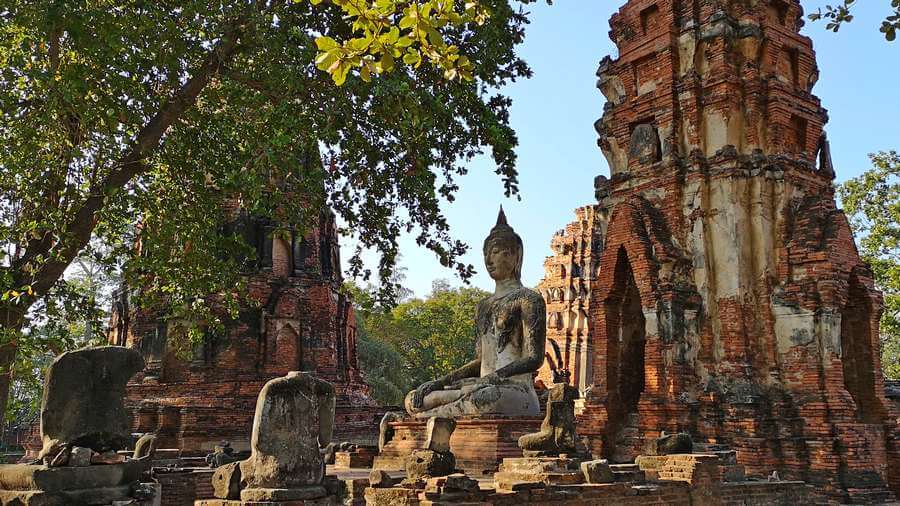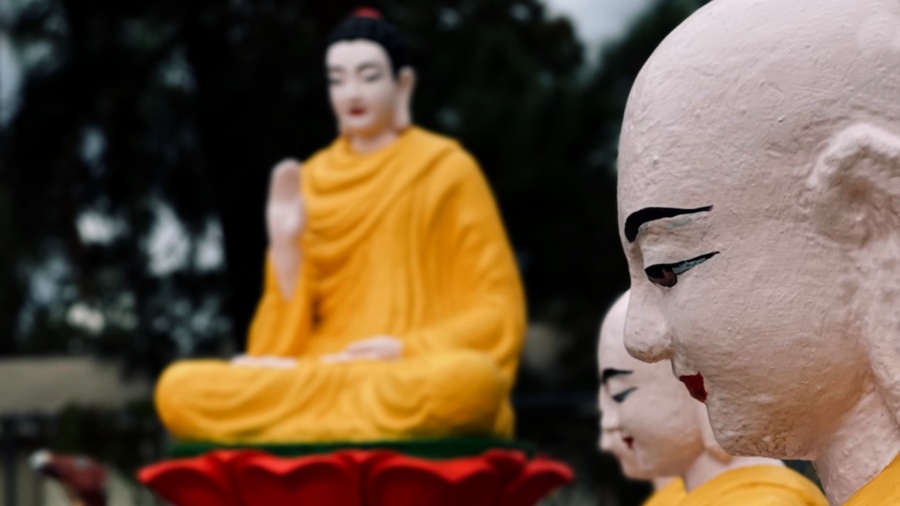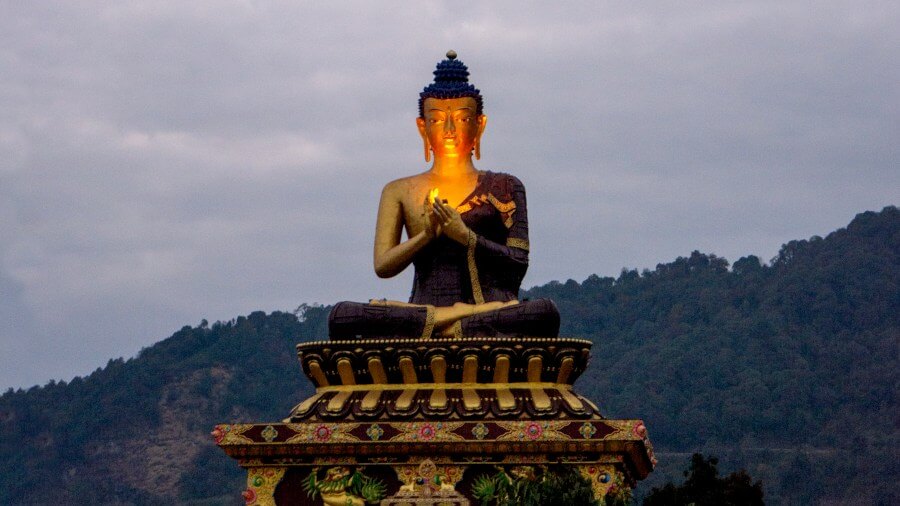[Note: In this excerpt, the Buddha takes the teaching on avoiding the extremes of self mortification and self indulgence (which he gave in his very first sermon) and illuminates how we can think about these teachings without criticizing or praising others. In this way we can avoid conflict while still teaching the Dhamma. It’s a wonderful reminder of how he was able to talk about good and bad qualities without personally criticizing people. This is just one of many cases of the Buddha showing his “supreme trainer of persons to be tamed” quality.]
‘Don’t indulge in sensual pleasures, which are low, crude, ordinary, ignoble, and pointless. And don’t indulge in self-mortification, which is painful, ignoble, and pointless.’ That’s what I said, but why did I say it?
Pleasure linked to sensuality is low, crude, ordinary, ignoble, and pointless. Indulging in such happiness is a principle beset by pain, harm, stress, and fever, and it is the wrong way. Breaking off such indulgence is a principle free of pain, harm, stress, and fever, and it is the right way.
Indulging in self-mortification is painful, ignoble, and pointless. It is a principle beset by pain, harm, stress, and fever, and it is the wrong way. Breaking off such indulgence is a principle free of pain, harm, stress, and fever, and it is the right way.
‘Don’t indulge in sensual pleasures, which are low, crude, ordinary, ignoble, and pointless. And don’t indulge in self-mortification, which is painful, ignoble, and pointless.’ That’s what I said, and this is why I said it.
· • ·
‘Avoiding these two extremes, the Realized One woke up by understanding the middle way of practice, which gives vision and knowledge, and leads to peace, direct knowledge, awakening, and extinguishment.’ That’s what I said, but why did I say it? It is simply this noble eightfold path, that is: right view, right thought, right speech, right action, right livelihood, right effort, right mindfulness, and right immersion.
‘Avoiding these two extremes, the Realized One woke up by understanding the middle way of practice, which gives vision and knowledge, and leads to peace, direct knowledge, awakening, and extinguishment.’ That’s what I said, and this is why I said it.
· • ·
‘Know what it means to flatter and to rebuke. Knowing these, avoid them, and just teach Dhamma.’ That’s what I said, but why did I say it? And how is there flattering and rebuking without teaching Dhamma?
In speaking like this, some are rebuked: ‘Pleasure linked to sensuality is low, crude, ordinary, ignoble, and pointless. All those who indulge in such happiness are beset by pain, harm, stress, and fever, and they are practicing the wrong way.’
In speaking like this, some are flattered: ‘Pleasure linked to sensuality is low, crude, ordinary, ignoble, and pointless. All those who have broken off such indulgence are free of pain, harm, stress, and fever, and they are practicing the right way.’
In speaking like this, some are rebuked: ‘Indulging in self-mortification is painful, ignoble, and pointless. All those who indulge in it are beset by pain, harm, stress, and fever, and they are practicing the wrong way.’
In speaking like this, some are flattered: ‘Indulging in self-mortification is painful, ignoble, and pointless. All those who have broken off such indulgence are free of pain, harm, stress, and fever, and they are practicing the right way.’
In speaking like this, some are rebuked: ‘All those who have not given up the fetters of rebirth are beset by pain, harm, stress, and fever, and they are practicing the wrong way.’
In speaking like this, some are flattered: ‘All those who have given up the fetters of rebirth are free of pain, harm, stress, and fever, and they are practicing the right way.’ That’s how there is flattering and rebuking without teaching Dhamma.
· • ·
And how is there neither flattering nor rebuking, and just teaching Dhamma? You don’t say: ‘Pleasure linked to sensuality is low, crude, ordinary, ignoble, and pointless. All those who indulge in such happiness are beset by pain, harm, stress, and fever, and they are practicing the wrong way.’ Rather, by saying this you just teach Dhamma: ‘The indulgence is a principle beset by pain, harm, stress, and fever, and it is the wrong way.’
You don’t say: ‘Pleasure linked to sensuality is low, crude, ordinary, ignoble, and pointless. All those who have broken off such indulgence are free of pain, harm, stress, and fever, and they are practicing the right way.’ Rather, by saying this you just teach Dhamma: ‘Breaking off the indulgence is a principle free of pain, harm, stress, and fever, and it is the right way.’
You don’t say: ‘Indulging in self-mortification is painful, ignoble, and pointless. All those who indulge in it are beset by pain, harm, stress, and fever, and they are practicing the wrong way.’ Rather, by saying this you just teach Dhamma: ‘The indulgence is a principle beset by pain, harm, stress, and fever, and it is the wrong way.’
You don’t say: ‘Indulging in self-mortification is painful, ignoble, and pointless. All those who have broken off such indulgence are free of pain, harm, stress, and fever, and they are practicing the right way.’ Rather, by saying this you just teach Dhamma: ‘Breaking off the indulgence is a principle free of pain, harm, stress, and fever, and it is the right way.’
You don’t say: ‘All those who have not given up the fetters of rebirth are beset by pain, harm, stress, and fever, and they are practicing the wrong way.’ Rather, by saying this you just teach Dhamma: ‘When the fetter of rebirth is not given up, rebirth is also not given up.’
You don’t say: ‘All those who have given up the fetters of rebirth are free of pain, harm, stress, and fever, and they are practicing the right way.’ Rather, by saying this you just teach Dhamma: ‘When the fetter of rebirth is given up, rebirth is also given up.’
That’s how there is neither flattering nor rebuking, and just teaching Dhamma. ‘Know what it means to flatter and to rebuke. Knowing these, avoid them, and just teach Dhamma.’ That’s what I said, and this is why I said it.
Read the entire translation of Majjhima Nikāya 139 Araṇavibhaṅgasutta: The Analysis of Non-Conflict by Bhikkhu Sujato on SuttaCentral.net. Or read a different translation on SuttaCentral.net, SuttaFriends.org, DhammaTalks.org, Ancient-Buddhist-Texts.net or AccessToInsight.org. Or listen on PaliAudio.com or SC-Voice.net. Or explore the Pali on DigitalPaliReader.online.
Or read a translation in Deutsch, Français, Lietuvių Kalba, Bengali, Català, Čeština, Español, Suomi, Hebrew, Magyar, Indonesian, Italiano, မြန်မာဘာသာ, Nederlands, Norsk, Português, ру́сский язы́к, සිංහල, Slovenščina, Svenska, தமிழ், ไทย, Tiếng Việt, or 汉语. Learn how to find your language.








